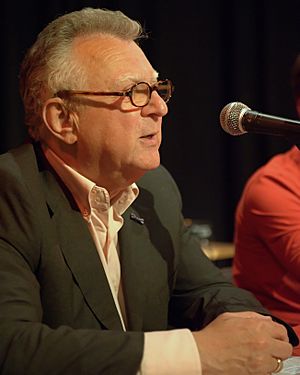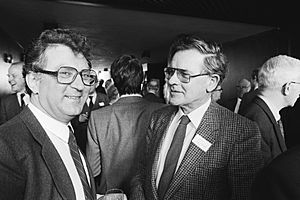Arnold Heertje facts for kids
Quick facts for kids
Arnold Heertje
|
|
|---|---|

Arnold Heertje (2009)
|
|
| Born | 19 February 1934 |
| Died | 4 April 2020 (aged 86) Naarden, Netherlands
|
| Nationality | Dutch |
| Institution | University of Amsterdam |
| Alma mater | University of Amsterdam |
Arnold Heertje (born February 19, 1934 – died April 4, 2020) was a famous Dutch economist. He was a professor at the University of Amsterdam, a writer, and a newspaper columnist. He became well-known for speaking out against big projects like the Betuweroute railway line.
Contents
Life and Career
Arnold Heertje was born in Breda, Netherlands, on February 19, 1934. His family was Jewish. During World War II, they had to hide from danger starting in November 1942. Eight-year-old Arnold stayed with a very religious family in Haarlemmermeer. He was so impressed by their strong faith and also by how poor they were. This made him want to learn why some people were poor. He later said that seeing the poverty of the families who helped him hide made him want to study economics. He wanted to understand where poverty came from.
From 1951 to 1956, Arnold studied economics at the University of Amsterdam. He did very well and earned his master's degree with honors. In 1960, he earned his doctorate degree. His special research was about how prices are set when only a few companies sell a product.
Heertje also taught at schools. From 1958 to 1968, he taught at the Maimonides Lyceum in Amsterdam. He also taught at the Baarnsch Lyceum in 1963 and 1964.
In 1962, Arnold Heertje became famous for his book called De kern van de economie (The Core of Economics). This book sold hundreds of thousands of copies and is still printed today.
From 1964 to 1999, he was a professor of Political Economy at the University of Amsterdam. He also taught the history of economic science from 1997 to 2006. He retired from the university in 2006 after teaching for over 40 years. In 1997, he became a member of the Royal Netherlands Academy of Arts and Sciences, which is a very important group of smart people.
Arnold Heertje was married and had three sons: Eric, Raoul, and Patrick. He also had three grandchildren. Like his son Raoul, who is a comedian, Arnold wrote columns for the newspaper Het Parool. Some of his columns were put together in a book called De vierkante waarheid (The Square Truth).
Arnold Heertje passed away on April 4, 2020, in Naarden, at the age of 86.
His Work and Ideas
Environmental Economics

Arnold Heertje believed that economics is about more than just money. He thought that focusing too much on buying things (consumerism) and making more money (financial growth) makes people forget about other important things. These include nature, a good quality of life, and feeling happy. He believed these things are hard to measure in money but are very important.
Heertje thought that when people make economic choices, they should also think about how it affects nature and people's well-being. Because of this, he supported living a simpler life.
He was strongly against extending the A15 motorway. He argued that the plans for paying for the project were not realistic.
Politics
Arnold Heertje was a member of the Labour Party in the Netherlands for most of his life. He was known for being a critical member. He often shared his strong opinions about the party's leaders.
He once said that he would speak up if he felt something was unfair. He believed that leaders were sometimes not good at their jobs.
Big Projects: Betuweroute and North/South Line
Heertje was very much against building the Betuweroute railway line. He was one of seven professors who spoke out against it. They believed it would cost too much money and not bring enough benefits. They were also worried about how the government ministry was handling the project.
Heertje also opposed building the new North/South line for the Amsterdam subway. He felt that the city did not have enough experience to manage such a big project. He thought it would lead to many problems with organization, technology, and money. He believed that private companies might take advantage of the public sector.
Helping the Community
In the 1970s, Arnold Heertje tried to save the Amsterdam Volkstoneel, a local theater group. He was the chairman of the group, but unfortunately, his efforts were not successful.
In the mid-1990s, he helped start a foundation to save the synagogue in Weesp. The synagogue had not been used since 1942. Thanks to donations, they bought the building from the city. He continued to be involved with the foundation that manages the building today.
In 2006, when the "Better Education Netherlands" group was started, Heertje joined their advisory committees. This group works to help students reach their full potential by supporting good education.
His Amazing Library
Arnold Heertje had a huge collection of scientific books, about 12,000 in total! He also collected old and rare books about economics. He owned 3,000 very special books. These included a first edition of Das Kapital by Karl Marx and a rare copy of An Essay on the Principle of Population by Thomas Robert Malthus from 1798.
Selective Publications
Here are some of the books Arnold Heertje wrote or helped edit:
- Heertje, Arnold, and Z. St-Gallay. Economics and technical change. London: Weidenfeld and Nicolson, 1977.
- Arnold Heertje (ed.) Schumpeter's Vision. New York: Praeger, 1981.
- Stiglitz, Joseph E & Arnold Heertje (ed.), The economic role of the state. (1989).
- Heertje, Arnold, and Mark Perlman. (eds.) Evolving technology and market structure: studies in Schumpeterian economics. University of Michigan Press, 1990.
- Polak, Jacob, and Arnold Heertje. European transport economics. Blackwell, 1993.
- Walker, Donald A., Arnold Heertje, and Hans Van Den Doel. Welfare economics and the theory of economic policy. Edward Elgar, 1995.
- Heertje, Arnold, and Heinz-Dieter Wenzel. Grundlagen der Volkswirtschaftslehre. Springer-Verlag, 2013.
Images for kids
 | Sharif Bey |
 | Hale Woodruff |
 | Richmond Barthé |
 | Purvis Young |


